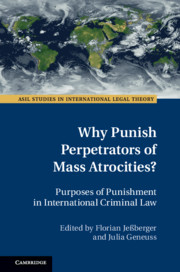Book contents
- Why Punish Perpetrators of Mass Atrocities?
- ASIL Studies in International Legal Theory
- Why Punish Perpetrators of Mass Atrocities?
- Copyright page
- Contents
- Contributors
- Preface
- Abbreviations
- 1 Introduction: The Need for a Robust and Consistent Theory of International Punishment
- 2 The Practical Importance of Theories of Punishment in International Criminal Law
- Part I Setting the Framework: Criminological, Historical and Domestic Perspectives
- Part II Rationales for Punishment in International Criminal Law: Theoretical Perspectives
- Part III Consequences for the Practice of the International Criminal Court
- Select Bibliography
- Index
2 - The Practical Importance of Theories of Punishment in International Criminal Law
Published online by Cambridge University Press: 07 February 2020
- Why Punish Perpetrators of Mass Atrocities?
- ASIL Studies in International Legal Theory
- Why Punish Perpetrators of Mass Atrocities?
- Copyright page
- Contents
- Contributors
- Preface
- Abbreviations
- 1 Introduction: The Need for a Robust and Consistent Theory of International Punishment
- 2 The Practical Importance of Theories of Punishment in International Criminal Law
- Part I Setting the Framework: Criminological, Historical and Domestic Perspectives
- Part II Rationales for Punishment in International Criminal Law: Theoretical Perspectives
- Part III Consequences for the Practice of the International Criminal Court
- Select Bibliography
- Index
Summary
In her introductory contribution by the former President of the ICC, Judge Silvia Fernández de Gurmendi, highlights the practical importance of theories of punishment in international criminal law in general and the work of the ICC in particular. She particularly discusses three goals of international criminal justice: conflict prevention, that is deterrence, reconciliation and rehabilitation. Regarding the former, she sees the impunity gap – which is due to the nature of the crimes and the lack of universality of the ICC’s jurisdiction – as the main obstacles for a potent deterrent effect to ensue. As regards the reconciliation she emphasizes the importance of ‘ownership’, accomplished by victims participation, and, in this regard, the importance of outreach. Regarding reconciliation, the outlines the elements of restorative justice in the ICC, and the problems connected to reparations and the limited scope of cases. Finally, as a third rationale for punishment, she discusses the rehabilitation of the convicted perpetrators.
Keywords
- Type
- Chapter
- Information
- Why Punish Perpetrators of Mass Atrocities?Purposes of Punishment in International Criminal Law, pp. 12 - 22Publisher: Cambridge University PressPrint publication year: 2020



